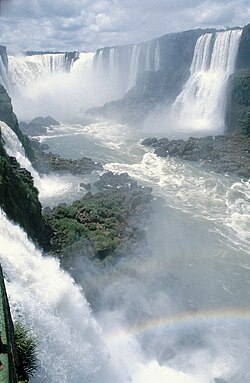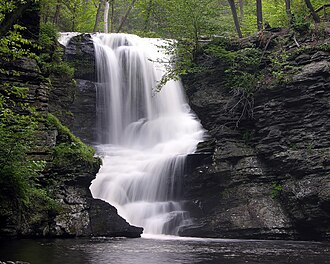Difference between revisions of "AY Honors/Waterfalls/Answer Key"
| Line 24: | Line 24: | ||
ha ha boom | ha ha boom | ||
| − | + | ha ha ugly freaks talking about waterfalls what loser just go swimming ok | |
| − | |||
| − | |||
| − | |||
| − | |||
| − | |||
| − | |||
| − | |||
| − | |||
| − | |||
| − | |||
| − | |||
| − | |||
| − | |||
| − | |||
| − | |||
| − | |||
| − | |||
| − | |||
| − | |||
| − | |||
| − | |||
| − | |||
| − | |||
== See also == | == See also == | ||
Revision as of 17:39, 7 February 2008
Template:Nofootnotes Template:Refimprove
A waterfall is usually a geological formation resulting from water, often in the form of a stream, flowing over an erosion-resistant rock formation that forms a sudden break in elevation or nickpoint.
Some waterfalls form in mountain environments where the erosive water force is high and stream courses may be subject to sudden and catastrophic change. In such cases, the waterfall may not be the end product of many years of water action over a region, but rather the result of relatively sudden geological processes such as landslides, faults or volcanic action.
Waterfalls may also be artificial, and they are sometimes created as garden and landscape ornaments.
Formation
Typically, a river flows over a large step in the rocks which may have been formed by a fault line. Over a period of years, the edges of this shelf will gradually break away and the waterfall will steadily retreat upstream, creating a gorge of recession. Often, the rock stratum just below the more resistant shelf will be of a softer type, meaning undercutting, due to splashback, will occur here to form a shallow cave-like formation known as a rock shelter or plunge pool under and behind the waterfall. Eventually, the outcropping, more resistant cap rock will collapse under pressure to add blocks of rock to the base of the waterfall. These blocks of rock are then broken down into smaller boulders by attrition as they collide with each other, and they also erode the base of the waterfall by abrasion, creating a deep plunge pool.
Streams become wider and more shallow just above waterfalls due to flowing over the rock shelf, and there is usually a deep pool just below the waterfall because of the kinetic energy of the water hitting the bottom.
Waterfalls can occur along the edge of glacial trough, whereby a stream or river flowing into a glacier continues to flow into a valley after the glacier has receded or melted. The large waterfalls in Yosemite Valley are examples of this phenomenon. The rivers are flowing from hanging valleys.
Classifying Waterfalls
The International Waterfall Classification System is the generally accepted scientific method of classifying the world's waterfalls. Waterfalls are grouped into 10 broad classes based on the average volume of water present on the fall using a logarithmic scale. Class 10 waterfalls include Niagara Falls, Paulo Alfonso Falls and Khone Falls. Class designations of other well known waterfalls include Victoria Falls and Kaieteur Falls (Class 9); Rhine Falls, Gullfoss and Sutherland Falls (Class 8); Angel Falls and Dettifoss (Class 7); Yosemite Falls and Lower Yellowstone Falls (Class 6). Source: International Waterfall Classification System (Outskirts Press 2006)
ha ha boom
ha ha ugly freaks talking about waterfalls what loser just go swimming ok
See also
External links
- World Waterfall Database
- WorldWaterfalls.com - Waterfall images and info, detailed waterfall types page
- Classification of waterfalls (Polish)
- GPS locations to waterfalls (mainly in Southeastern United States)
ar:شلال zh-min-nan:Chúi-chhiâng bg:Водопад ca:Cascada cy:Rhaeadr cs:Vodopád da:Vandfald de:Wasserfall et:Juga el:Καταρράκτης es:Cascada eo:Akvofalo eu:Ur-jauzi fa:آبشار fr:Chute d'eau gd:Eas gl:Fervenza gu:ધોધ ko:폭포 hi:झरना id:Air terjun iu:ᖁᖅᓗᕐᓂᖅ/quqlurniq is:Foss it:Cascata he:מפל מים la:Aqua cadens lt:Krioklys nl:Waterval ja:滝 no:Foss nn:Foss pl:Wodospad pt:Queda de água ro:Cascadă qu:Phaqcha ru:Водопад simple:Waterfall sk:Vodopád sl:Slap sr:Водопад su:Curug fi:Vesiputous sv:Vattenfall ta:அருவி vi:Thác chr:ᎠᎹᏍᎧᎦᎯ tr:Şelâle uk:Водоспад ur:آبشار zh:瀑布



